|
|
|
Sort Order |
|
|
|
Items / Page
|
|
|
|
|
|
|
| Srl | Item |
| 1 |
ID:
061576


|
|
|
|
|
| Publication |
May-Jun 2005.
|
| Summary/Abstract |
This article provides a descriptive, operational analysis of the modern anarchist movement, emphasizing the actions of the criminal anarchists and implications for US law enforcement. It begins by explaining some core tenets of anarchist “theory,” and its relationship to violence, then describes the structure, tactics and tradecraft of militant anarchist activists. It concludes that Anarchism is a revolutionary movement, not just a “protest group.” Clearly not all anarchists advocate or engage in violence, but some do. Those individuals and factions pose a particular concern to law enforcement. This article offers some practical recommendations to law enforcement for preventing and managing those direct action attacks that may compromise public safety.
|
|
|
|
|
|
|
|
|
|
|
|
|
|
|
|
| 2 |
ID:
112720


|
|
|
|
|
| Publication |
2012.
|
| Summary/Abstract |
We investigate bank risk taking, efficiency and their relation to law enforcement using a unique sample of 133 Chinese city commercial banks across 31 regions for the 1999-2008 period. We find that stronger law enforcement tends to promote greater bank risk taking in the region. Furthermore, employing a stochastic distance function approach, our analysis shows that the performance of Chinese city commercial banks, as measured by bank efficiency, is heavily influenced by the effectiveness of law enforcement in the region. Better legal environment, higher efficiency in the legal system, and stronger protection of intellectual property right are associated with a higher level of efficiency among these banks.
|
|
|
|
|
|
|
|
|
|
|
|
|
|
|
|
| 3 |
ID:
144186


|
|
|
|
|
| Summary/Abstract |
The UK appears to be making a cautious return to international policing after a decade of following an approach best described as ‘muddling through’. Recent reforms and new co-ordinating structures seek to improve coherence and promote the British model of policing abroad. These are timely initiatives as international policing is also under review at the UN. Yet what is missing – argue Stephanie Blair and Maureen Brown – is a clear, pragmatic, realistic and holistic UK government strategy for international policing and law enforcement that would provide a sense of purpose, ambition and direction, and deliver coherence across UK domestic and international security objectives.
|
|
|
|
|
|
|
|
|
|
|
|
|
|
|
|
| 4 |
ID:
126982
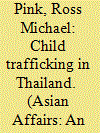

|
|
|
|
|
| Publication |
2013.
|
| Summary/Abstract |
"Child Trafficking in Thailand: Prevention and Prosecution Challenges" examines the deep rooted problem of child trafficking in Thailand and the systemic realities of marginalization, corruption, low police training and salaries and poverty that have led to ineffective law enforcement against traffickers.
|
|
|
|
|
|
|
|
|
|
|
|
|
|
|
|
| 5 |
ID:
189929


|
|
|
|
|
| Summary/Abstract |
The civil-military relations literature on Turkey focuses predominantly on the guardianship role of the Turkish military, its interventions, and the role of the National Security Council as the main institutional mechanism of military tutelage. Yet, the existing studies lack a much-needed focus on the law enforcement or policing missions of the Turkish military. To fill this gap, this study discusses the EMASYA Protocol (Emniyet Asayiş Yardımlaşma or Security and Public Order Assistance), a secret protocol signed in 1997. Emerging in the context of political instability and military tutelage of the 1990s, the Protocol enabled the military to conduct internal security operations without permission from the civilian authorities. This paper argues that the EMASYA Protocol provided a sphere of “reformulated new professionalism” for the Turkish military, enabled it to specialize in the war against rising internal threats such as reactionary Islam and Kurdish separatism, and created anomalies in civil-military relations in Turkey.
|
|
|
|
|
|
|
|
|
|
|
|
|
|
|
|
| 6 |
ID:
165894
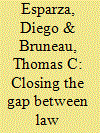

|
|
|
| 7 |
ID:
146819
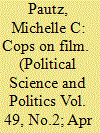

|
|
|
|
|
| Summary/Abstract |
With numerous recent incidents in which law-enforcement officers played a role in the deaths of citizens, there is a renewed focus on cops and their actions. Part of that discussion is related to the nation’s preconceived notions of cops and where those ideas might originate. Popular culture contributes to those images; this study explores one source of those images: film. More specifically, it investigates the image of law enforcement on the silver screen from 1984 through 2014. With a sample of 34 films and more than 200 cop characters, this study finds a mixed general depiction of law enforcement in movies but a positive depiction of individual cop characters. The prevalent descriptor of those characters was good, hard-working, and competent law-enforcement officers. This exploratory study informs broader discussions about the images of cops found in popular culture.
|
|
|
|
|
|
|
|
|
|
|
|
|
|
|
|
| 8 |
ID:
176486


|
|
|
|
|
| Summary/Abstract |
The article argues that the impact of law enforcement efforts against corruption deserves more scholarly attention. Drawing on a mixed-methods study from Malawi in southern Africa, where a large-scale law enforcement operation has been investigating and prosecuting those involved in a 2013 corruption scandal known as ‘Cashgate’, the article explores the potential for corruption deterrence from the perspective of government officials in the Malawi civil service. Malawi provides a challenging environment for deterrence due to limited state capacity, weak law enforcement agencies and widespread corruption. Nonetheless, the research findings show that Malawian government officials perceive prosecutions and convictions to deter corruption, both with regards to the law enforcement response to Cashgate specifically and law enforcement efforts in general. The findings from Malawi suggest that law enforcement and criminal justice have the potential to make an important contribution to anti-corruption strategies in Africa and the Global South at large.
|
|
|
|
|
|
|
|
|
|
|
|
|
|
|
|
| 9 |
ID:
083143


|
|
|
|
|
| Publication |
New York, Springer, 2008.
|
| Description |
xi, 142p.
|
| Standard Number |
9780387768731
|
|
|
|
|
|
|
|
|
|
|
|
Copies: C:1/I:0,R:0,Q:0
Circulation
| Accession# | Call# | Current Location | Status | Policy | Location |
| 053786 | 363.32516/PIC 053786 | Main | On Shelf | General | |
|
|
|
|
| 10 |
ID:
065137
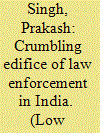

|
|
|
| 11 |
ID:
158647
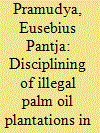

|
|
|
|
|
| Summary/Abstract |
The Indonesian state has issued many regulations to control palm oil expansion, but they have been weakly enforced, resulting in widespread illegal plantations. During the last decade, Indonesian authorities have used force to reduce illegal plantations. This article analyses the drivers behind these actions and questions to what extent they reflect the rise of eco-authoritarianism. By investigating six cases of disciplinary action in Sumatra, we conclude that the Indonesian state is neither practising eco-authoritarianism nor constituting a green state. The disciplinary action, however, has had limited success in environmental terms due to policy incoherence, violent contestation and the sector’s historical context.
|
|
|
|
|
|
|
|
|
|
|
|
|
|
|
|
| 12 |
ID:
112760


|
|
|
|
|
| Publication |
2012.
|
| Summary/Abstract |
Article 100 of the UN Convention on the Law of the Sea requires parties to "cooperate" against maritime piracy, but how this cooperation is to be achieved is undefined. Enforcement is a public good-creating uncompensated benefits for others, thus suffering from free rider problems. The analysis in this article explains why more pirates captured are released than prosecuted, why the United Nations and the International Maritime Organization are seeking to reduce enforcement costs, why some in the shipping industry want to apply the 1988 Convention Against Terrorism at Sea, and why still others want to move prosecution of pirates from national courts to an international court.
|
|
|
|
|
|
|
|
|
|
|
|
|
|
|
|
| 13 |
ID:
166662
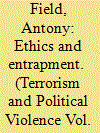

|
|
|
|
|
| Summary/Abstract |
This article examines domestic counterterrorism sting operations in the USA. It considers why critics consider these operations unethical and illegitimate. In particular, it looks at claims that counterterrorism sting operations have entrapped innocent people. This article explains why the U.S. courts have rejected claims of entrapment. It discusses different standards of entrapment used by the U.S. courts and sets out how these standards apply to counterterrorism sting operations. The article will show how key pieces of evidence convinced the courts that the targets of sting operations were predisposed towards terrorism. As a result, defendants were not able to mount successful entrapment defenses. By the end of the article, the reader will have a better understanding of the ethical and legal safeguards governing counterterrorism sting operations in the USA.
|
|
|
|
|
|
|
|
|
|
|
|
|
|
|
|
| 14 |
ID:
092466
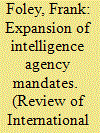

|
|
|
|
|
| Publication |
2009.
|
| Summary/Abstract |
The UK's domestic intelligence agency, MI5, has become increasingly involved in the realm of law enforcement over the last decade. This article puts the British experience in perspective by comparing it with France's main domestic intelligence agency, which has pushed deep into the law enforcement arena in recent years. A similar perception of Islamist terrorism underpins these parallel developments in the two countries. However, differences relating to accountability, legal systems and conceptions of the state mean that the French intelligence agency has expanded its role considerably more than its British counterpart. The analysis indicates that MI5's move into law enforcement is likely to remain a relatively conservative one.
|
|
|
|
|
|
|
|
|
|
|
|
|
|
|
|
| 15 |
ID:
175277


|
|
|
|
|
| Summary/Abstract |
Can gender-based “enclaves” facilitate women’s access to justice? I examine all-female police stations in India and test whether group-specific institutions assist victims of gender-based violence and female officers in law enforcement. I create an original dataset based on Indian police reports and leverage the manner in which all-women police stations were opened in Haryana state to estimate their causal effect. The creation of enclaves in law enforcement does not increase registered crime. In fact, the intervention lowers the caseload at standard stations by justifying the deflection of gendered crimes, reduces responsibilities for policewomen, and increases travel cost for victims seeking redress. The institutions formalize the “counseling” of victims by encouraging reconciliation with abusers at the expense of arrest of suspects, and survey evidence suggests that all-women stations might not be associated with positive perceptions of policewomen. Broadly, I argue that representation as separation may have unintended consequences.
|
|
|
|
|
|
|
|
|
|
|
|
|
|
|
|
| 16 |
ID:
145107


|
|
|
|
|
| Summary/Abstract |
Human trafficking has been the subject of growing attention from both scholars and policymakers. The internationally accepted definition of human trafficking used by governments and international organizations identifies three purposes of trading in persons: sexual exploitation, labor exploitation, and the removal of organs. I argue that conflating sex, labor, and organ trafficking in policy initiatives and in the scholarly literature overlooks major differences between these practices—differences that greatly affect governments' willingness and ability to curb them. This article identifies three such differences: the social status and political influence of the perpetrators, the precision of norms and their resonance with audiences, and the costs of enforcement. Through these distinctions, I explain why Israel has been vigorous in combating sex trafficking, yet hesitant to tackle labor and organ trafficking. The Israeli experience highlights the different challenges posed by sex, labor, and organ trafficking and offers important lessons for the study of these phenomena.
|
|
|
|
|
|
|
|
|
|
|
|
|
|
|
|
| 17 |
ID:
178973


|
|
|
|
|
| Summary/Abstract |
The day-to-day behaviors of undocumented immigrants are significantly affected when local law enforcement officials do the work of federal immigration enforcement. One such behavior, which has been widely discussed in debates over so-called sanctuary policies, is that undocumented immigrants are less likely to report crimes to the police when local law enforcement officials work with U.S. Immigration and Customs Enforcement (ICE) on federal immigration enforcement. However, the mechanism that explains this relationship of decreased trust in law enforcement has not yet been systematically tested. Do undocumented immigrants become less trusting of police officers and sheriffs when local law enforcement officials work with ICE on federal immigration enforcement? To answer this, we embedded an experiment that varied the interior immigration enforcement context in a survey (n = 512) drawn from a probability-based sample of undocumented immigrants. When local law enforcement officials work with ICE on federal immigration enforcement, respondents are statistically significantly less likely to say that they trust that police officers and sheriffs will keep them, their families, and their communities safe; will protect the confidentiality of witnesses to crimes even if they are undocumented; will protect the rights of all people equally, including undocumented immigrants; and will protect undocumented immigrants from abuse or discrimination.
|
|
|
|
|
|
|
|
|
|
|
|
|
|
|
|
| 18 |
ID:
027469


|
|
|
|
|
| Publication |
New Jersey, Prentice-Hall Inc, 1971.
|
| Description |
xii, 241p.
|
|
|
|
|
|
|
|
|
|
|
|
Copies: C:1/I:0,R:0,Q:0
Circulation
| Accession# | Call# | Current Location | Status | Policy | Location |
| 006989 | 302/COF 006989 | Main | On Shelf | General | |
|
|
|
|
| 19 |
ID:
122444


|
|
|
|
|
| Publication |
2013.
|
| Summary/Abstract |
The credit for bringing the Human Rights issue into public consciousness
and making it a major concern of public interest in India goes ironically
to terrorism. With the outbreak of terrorism in Punjab in 1980s
necessitating large scale deployment of armed forces in aid of Police
and the emergence of public spirited individuals and groups ready to
take up cudgels on behalf of the victims of State excesses, the violations
of citizens' rights and liberties became a regular feature of law
enforcement. Before this, far greater atrocities committed by the police
and administration in dealing with the problems of interstate dacoity
and communal riots in various States and in fighting insurgency in the
North-East had failed to generate any significant reaction among the
general public. It is also worth noting that Pakistan could ultimately
succeed in internationalizing the Kashmir issue not on the strength of
its claims vis-à-vis ours but from the angle of the alleged human rights
violations by Security forces. It is thus clear that terrorism plays a
crucial role in determining the human rights discourse and shaping the
human rights record of a nation State.
|
|
|
|
|
|
|
|
|
|
|
|
|
|
|
|
| 20 |
ID:
188075
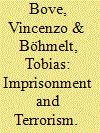

|
|
|
|
|
| Summary/Abstract |
While policymakers frequently praise the impact of law enforcement for addressing the threat of terrorism, several cases suggest that the imprisonment of terrorists and potential perpetrators may actually lead to (more) radicalization and, ultimately, a higher risk of terrorism. We take systematic stock of the arguments linking terrorism with incarceration and analyze newly collected data on worldwide prison populations. The results from quantitative analysis highlight that an increase in prison population is correlated with a decline in the number of terrorist attacks, in particular its domestic form. We conclude with a discussion of the implications of this finding for academic and policy circles.
|
|
|
|
|
|
|
|
|
|
|
|
|
|
|
|
|
|
|
|
|